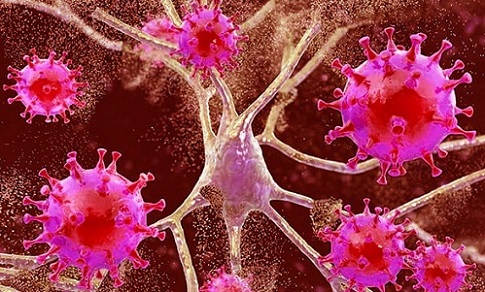COVID-19 Virus Found to Disrupt Key Brain Protein TDP-43 in a Manner Similarly Seen in Alzheimer and ALS-Like Diseases
Nikhil Prasad Fact checked by:Thailand Medical News Team May 20, 2025 9 months, 5 days, 3 hours, 6 minutes ago
Medical News: New South Korean Study Uncovers How SARS CoV-2 Hijacks Brain Proteins and Sparks Neurodegeneration
Scientists from multiple leading research institutes in South Korea have revealed shocking evidence that the virus behind COVID-19 can trigger harmful changes in the brain that resemble those found in serious neurodegenerative conditions like Alzheimer’s disease, Parkinson’s disease, and ALS (amyotrophic lateral sclerosis). At the heart of the findings is a protein called TDP-43, which plays a crucial role in regulating RNA and maintaining the health of neurons.
 COVID-19 Virus Found to Disrupt Key Brain Protein TDP-43 in a Manner Similarly Seen in
COVID-19 Virus Found to Disrupt Key Brain Protein TDP-43 in a Manner Similarly Seen in
Alzheimer and ALS-Like Diseases
The research was led by experts from the Department of Infectious Diseases at the College of Veterinary Medicine at Konkuk University, the Korea Institute of Science and Technology (KIST), the Korea Brain Research Institute (KBRI), and the Daegu Gyeongbuk Institute of Science and Technology (DGIST). This
Medical News report highlights how this team of scientists explored the link between SARS-CoV-2 infection and pathological changes in TDP-43 that mirror those seen in patients suffering from long-term brain diseases.
What Is TDP-43 and Why It Matters
TDP-43 is a protein that normally helps with processing genetic material in brain cells. But when it becomes misfolded or clumps together abnormally in the wrong parts of the cell—especially in the cytoplasm rather than the nucleus—it can cause cell death and inflammation. Such changes are well known to be involved in conditions like ALS and frontotemporal dementia (FTD). The new study shows that SARS-CoV-2 can directly interfere with TDP-43, causing it to break apart, clump up, and misbehave inside the brain’s cells.
This happens through several viral tricks. One example involves a viral enzyme called Mpro, which cleaves or slices up host proteins. This enzyme cuts TDP-43 at a specific point, leading it to form toxic clumps. These clumps can then disrupt the normal flow of RNA inside the brain’s cells. The researchers also observed that another viral protein called the nucleocapsid (N) protein forms sticky structures by binding with TDP-43 and RNA, promoting more of this abnormal clumping behavior.
The Link to Long COVID Symptoms and Brain Damage
The research also offers insight into why some COVID-19 survivors experience long-lasting brain fog, memory loss, or even new symptoms resembling dementia or Parkinson’s. Mouse models infected with a related coronavirus showed long-term brain damage, with clear signs of abnormal TDP-43 deposits and inflammation even 12 months after infection. These changes included loss of important brain proteins like synaptophysin, which helps nerve cells communicate.
Furthermore, the study pointed out that SARS-CoV-2 may hijack certain receptors in the brain, such as the ACE2 receptor. By binding to ACE2 and pulling it into the cell, the virus disrupt
s a protective signaling pathway that usually keeps inflammation and harmful protein changes under control. This might explain why infected individuals, particularly older people or those with preexisting brain conditions, are at a higher risk of experiencing serious neurological complications.
TDP-43 as a Biomarker for COVID-19 Related Brain Disorders
Another exciting aspect of the study is the potential to use TDP-43 as a biomarker. Researchers found that in blood samples from COVID-19 survivors suffering from lingering neurological symptoms, levels of TDP-43 were significantly higher than in those who fully recovered. These findings suggest that doctors may one day be able to track this protein in patients’ blood to assess brain damage and better predict who might suffer from long COVID-related brain issues.
Interestingly, levels of TDP-43 were found to fluctuate in COVID-19 patients during their hospital stay. While levels dropped for a short time, they eventually bounced back, correlating with inflammation levels measured by ferritin. This adds to the growing evidence that TDP-43 is a key player in the brain’s reaction to COVID-19 infection.
Brain Changes in Real COVID-19 Patients
Examinations of human brain tissues from deceased Alzheimer’s patients who also had COVID-19 showed clear signs of TDP-43 accumulating around blood vessels in the brain, particularly in regions like the hippocampus and prefrontal cortex. These are areas heavily involved in memory and decision-making. The buildup of this harmful protein also corresponded with damage to the blood-brain barrier, a protective layer that normally keeps harmful substances out of the brain. Once breached, the brain becomes vulnerable to a cascade of inflammation and cell damage.
Could COVID-19 Make Preexisting Brain Disorders Worse
The study warns that individuals already suffering from neurodegenerative conditions like ALS, Alzheimer’s, or Parkinson’s may experience faster disease progression after a COVID-19 infection. TDP-43-related brain damage was seen to worsen existing symptoms and could even help trigger such diseases in people who were previously undiagnosed. Researchers found that this was not limited to TDP-43 alone—SARS-CoV-2 also interacted with other dangerous proteins like tau and amyloid beta, both of which are heavily implicated in Alzheimer’s disease.
What This Means Going Forward
This groundbreaking research underscores a major warning—that COVID-19 is not just a respiratory illness. Its long-term effects can seriously impact brain health, especially through the hijacking of key brain proteins like TDP-43. Understanding how SARS-CoV-2 promotes TDP-43 clumping and misbehavior opens the door to developing new treatments aimed at blocking these changes before they cause permanent neurological damage.
It also provides strong support for further surveillance of COVID-19 survivors—especially those experiencing long COVID symptoms or those with underlying neurological conditions. Monitoring TDP-43 levels in blood could become a helpful tool in clinics, offering early warning signs before severe brain decline sets in.
The study findings were published in the peer reviewed journal: Viruses.
https://www.mdpi.com/1999-4915/17/5/724
For the latest COVID-19 News, keep on logging to Thailand
Medical News.
Read Also:
https://www.thailandmedical.news/news/russian-study-reveals-concerning-diffuse-brain-changes-in-acute-and-post-covid-19-phases
https://www.thailandmedical.news/news/two-years-after-infection-covid-19-found-to-have-restructured-the-brain-making-it-dysfunctional
https://www.thailandmedical.news/news/breaking-news-study-reveals-potential-new-form-of-brain-neurodegeneration-linked-to-covid-19
https://www.thailandmedical.news/articles/coronavirus
https://www.thailandmedical.news/pages/thailand_doctors_listings
